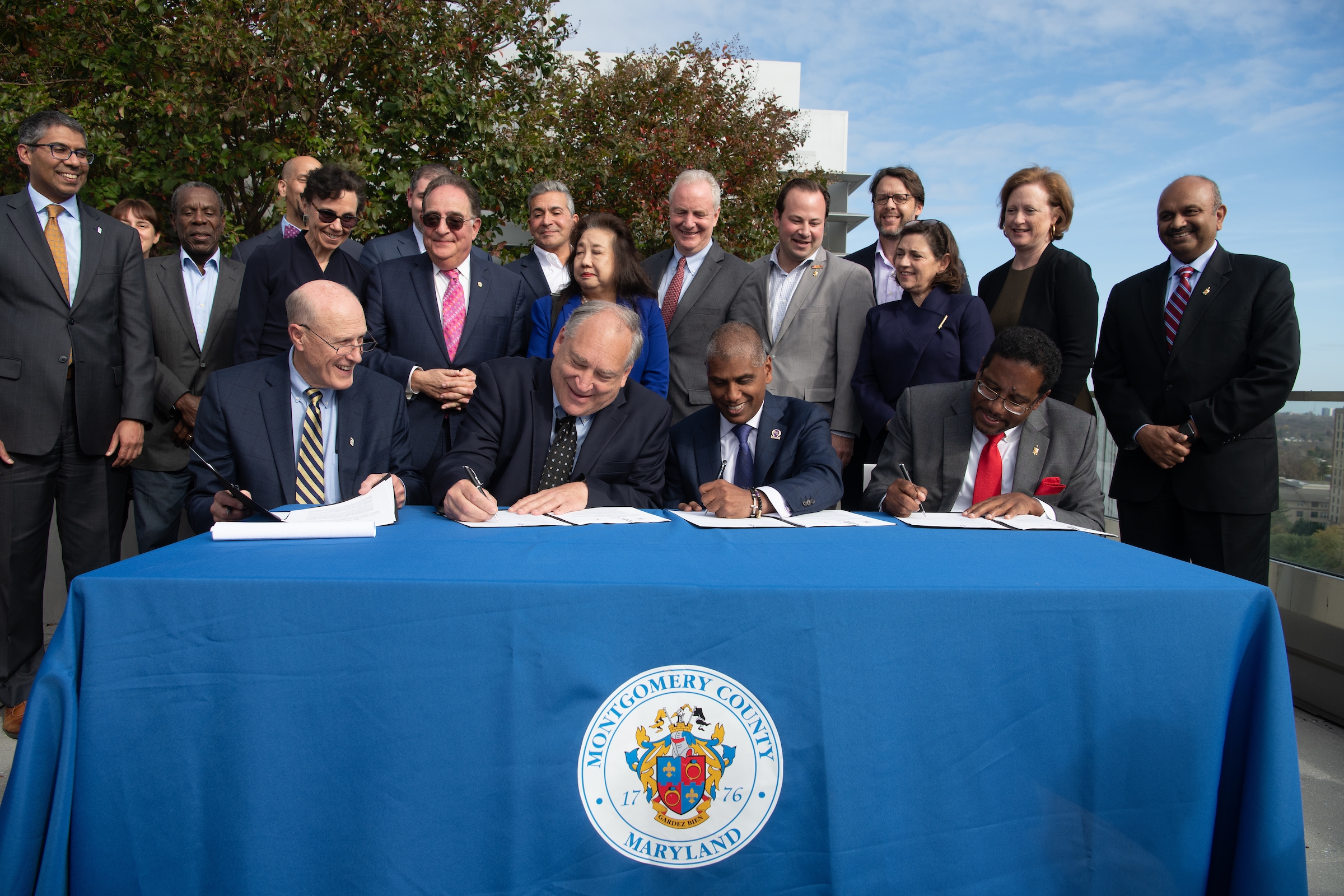University of Maryland Strategic Partnership Announces New Institute to Transform Medicine Using Big Data and Artificial Intelligence Technologies
The University of Maryland Strategic Partnership: MPowering the State (MPower) today announced a transformative partnership to establish the University of Maryland 3 - Institute for Health Computing (UM-3-IHC), which is being led by the University of Maryland, Baltimore (UMB) and the University of Maryland, College Park (UMCP), in collaboration with the University of Maryland Medical System (UMMS) and Montgomery County, Md. This new Institute will leverage recent advances in artificial intelligence (AI) and computing to create a premier learning health care system that evaluates both de-identified and secure digitized medical health data to diagnose, prevent and treat diseases in patients across the state of Maryland.

“We are witnessing an unprecedented revolution in health care that is being driven by biomedical innovation, the digitization of medical records, and advances in machine learning and artificial intelligence,” said UMB President Bruce E. Jarrell. “This new Institute will include all of these elements in a synergistic effect that will transform our health care system.”
“Scaling up research to address grand challenges in the life sciences has shifted from collecting data to using cutting-edge technology to discover meaningful patterns hidden in the data,” said UMCP President Darryll J. Pines. “This Institute will tap world-class researchers who are exploring artificial intelligence, machine learning, and virtual and augmented reality to collaborate with medical experts, leading to broad impacts on human health and well-being.”
Harnessing the innovations in health care technologies has become an urgent priority as our nation faces an economic crisis and contends with the ongoing COVID-19 pandemic. Health care leaders have long recognized that health care efficiencies can be greatly improved with the digitization of medical records.
“Part of our foundational mission as healthcare leaders is to engage in pioneering research in order to develop the cures of tomorrow while also caring for patients each and every day across our System,” said UMMS President and CEO Mohan Suntha. “De-identified data from 1.8 million patients within our System along with clinical research data from UMB will provide the backbone for advanced clinical analytics that may ultimately lead to faster diagnoses, improvements in how therapeutics are utilized and a range of other improved outcomes for our patients, as well as patients all over the world.”
The new Institute will incorporate technologies, including the use of machine-learning algorithms, to study emerging diseases and help establish precision patient care to halt disease progression. For example, poorly controlled diabetes, high blood pressure, risk of opioid overdose, and early kidney disease can be identified by trending changes in lab tests in outpatients, allowing targeted interventions to prevent disease progression. Such efforts will lead to improved care for the patient yielding better diagnoses and treatments tailored to an individual’s unique health needs.
“The integration of ‘big data’ with artificial intelligence and immersive technologies in health care is fundamentally changing the way we will treat patients – enabling us to vastly improve and personalize care for each individual,” said Mark T. Gladwin, UMB vice president for medical affairs and the John Z. and Akiko K. Bowers Distinguished Professor and dean, University of Maryland School of Medicine. “Our vision is for this to become the East Coast Silicon Valley for health computing. The goals of this new Institute perfectly align with the University of Maryland School of Medicine’s new strategic vision to utilize disruptive technology and embrace and harness the power of clinical analytics and precision medicine to enhance patient care and provide population health services.”
The U.S. speed to discovery of a vaccine for COVID-19 during the pandemic was reliant on AI to accelerate advances in the underlying lab research. North Bethesda’s proximity to NIST, NIH, FDA, Walter Reed, and the Naval Medical Research Center provides a prime location for this novel and urgent cutting-edge research. The Institute at North Bethesda will bring together world-class researchers from two university partners prominent in these fields to explore how AI, machine learning, and virtual and augmented reality can facilitate knowledge discovery for human health and well-being.
New immersive and 5G wireless technologies will further increase the availability and capability of telehealth functions, particularly in rural communities. Virtual and augmented reality over 5G networks will expand the diagnostic capabilities of clinicians.
“Virtual reality is already transforming medical education and training by enabling medical students and professionals to practice clinical encounters and complex operations in risk-free, cost-effective, and realistic virtual environments,” said Amitabh Varshney, dean of the College of Computer, Mathematical, and Natural Sciences at UMCP. “By leveraging these emerging technologies, the Institute will serve as a testbed for lifesaving training modules before they are deployed on a global scale.”
The Institute will catalyze a clinical data science ecosystem at North Bethesda that draws FDA and NIH investigators, UMB and UMCP faculty, medical bioinformatic educational programs and students, and industry partners, allowing expansion of computational “dry” laboratories, virtual meeting rooms and classrooms.
The Institute is expected to open in leased space in early 2023, with final completion of laboratory and office space at the North Bethesda Metro location in 2028. Initial funding of $25 million is provided by MPower. Montgomery County government will provide an additional $40 million to develop the North Bethesda site.







